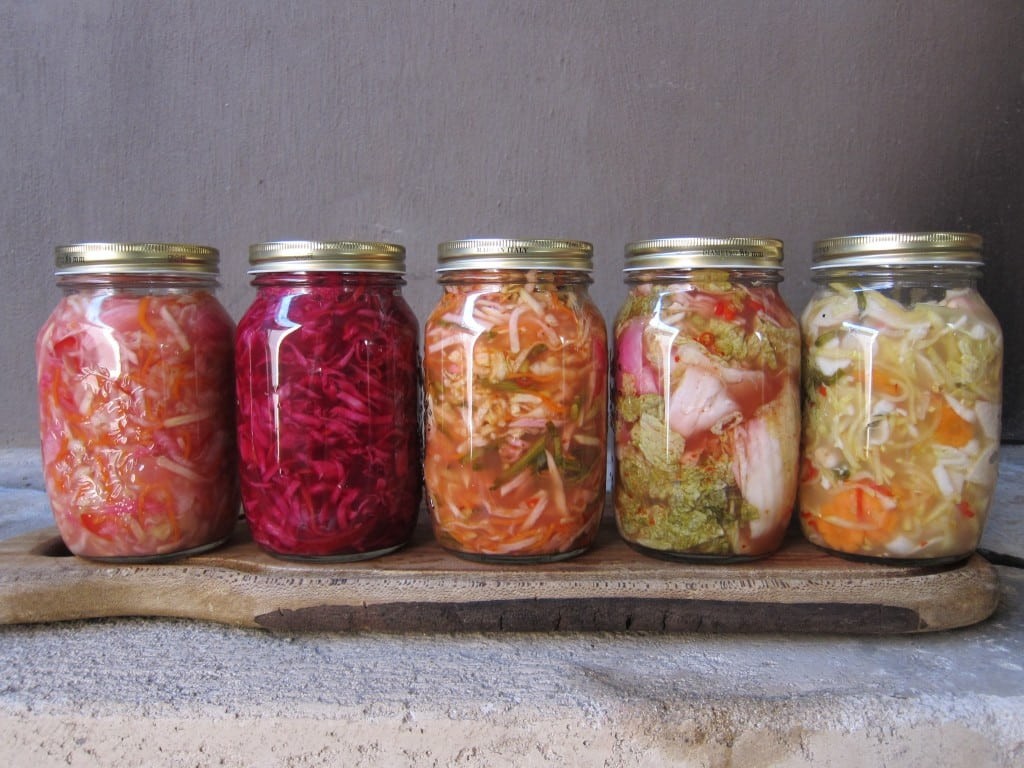Fermented foods have been at the forefront lately but they have been around for centuries, so why this renewed interest in them now?
Research exploring these live products and their effect on gut, brain, and body health has revitalized public interest. Lactobacilli and Bifidobacterium are but a few of the essential, healthy bacteria that are produced through the fermentation process. These beneficial bacteria (along with others) are what we today call probiotics – which forms the foundation for physical, mental, and emotional well-being. Did you know for example, that almost 80 percent of your immune system is actually located in your gut? Or, that the greatest concentration of serotonin, which is involved in mood control, depression and aggression, is found in your intestines, not your brain?
your gut? Or, that the greatest concentration of serotonin, which is involved in mood control, depression and aggression, is found in your intestines, not your brain?
It’s true! The main takeaway then is that keeping your gut happy and healthy will strengthen your immune system and keep your brain happy and healthy too.
By having the ideal balance of good and bad bacteria in your gut, a ratio of 85% good bacteria to 15% bad, these microflora play a crucial role in all aspects of our health.
Today, yogurt is probably the most well-known food that comes to mind when you ask someone if they eat fermented foods. Many people may not realize that we can thank the Neolithic peoples of Central Asia dating back to 6000 B.C for the introduction of this food into our diet. Apparently, herdsmen began the practice of milking their animals, and the natural enzymes in the carrying containers (animal stomachs) curdled the milk, essentially making yogurt. Over the centuries, yogurt has been used to cure bowel troubles and diarrhea. Some assume that including yogurt as a probiotic is enough. While that may have been true in the past, it is not so now.
You may want to consider adding at least one more other fermented food into your diet to keep maintain a strong immune system. The reason being that by including a variety of fermented foods and beverages, you will be getting a mix of different microorganisms that will inoculate your gut. Plus, for those who cannot handle soured milk products like yogurt, there are many other traditional fermented foods to pick from.
If you are wondering where to start, you could ask your grandparents what they ate when they were growing up. Depending on your genetic background, you would likely hear of an interesting and varied selection of fermented foods.
For example, if your heritage is Japanese, you might remember eating homemade miso (fermented soybean paste) umeboshi (pickled plums)or natto (fermented soybeans).
If your roots go back to Germany or Eastern Europe, it could have been sauerkraut –finely shredded, fermented white cabbage; whereas, the Asians have been consuming kimchi, a variation on pickled fermentations of cabbage, turnips, eggplant, cucumbers, onions, squash, and carrots for centuries. By consuming a small amount (one to two tablespoons) of fermented food at each meal you will be gaining a wide variety of beneficial bacteria that will keep your gut healthy and your immune system strong.
And remember, when adding traditional fermented foods to your meals, the key is to eat a small portion (one to two tablespoons) of them on a very regular basis so that your digestive system can get accustomed to them. The recommendation is once or twice daily with meals for best results.

